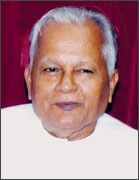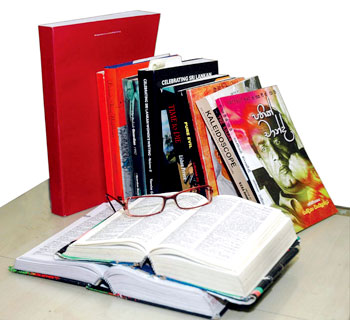That five letter word
|
An Open book
|

Deshabandu S. Godage
|
Deshabandu Godage's own story is an open book
in itself. Having twice run away from home when he was a teenager, first
to work as a waiter in a kiosk in Kalutara, then to be an assistant in
an aquarium in Colombo his third job was in a printing company called
the Wijesekara Press where he learnt how to cast the types needed for
printing.
His next training in bookbinding came when he
worked for D.F. Dodangoda and Company.
As Professor Tissa Kariyawasam reveals in
"Aspects of Culture in Sri Lanka", as the binders and printers were
poorly paid there were discussions among them to launch a strike.
Those who took part were sacked and so was
Godage. "As he put it he was on the road again. What did he do? He got a
small room in Gorakana. He converted it into a workshop. He started
binding books." Was he successful? "He lived from hand to mouth. But he
tried to save money whenever he could.
He knew otherwise there was no future for him.
With great difficulty he did manage to save a few hundred rupees. With
this money and with the blessings of Venerable Ananda Maitreya Maha
Nayaka Thera he started his own binding firm at Dematagoda.
Thus having chosen a "book" which few dare to
"read", today he has become a legend in the literary arena.
|
by Aditha Dissanayake
As usual when I saw them, I lost total self control. My heart beat
increased rapidly. I yearned to touch, to caress, to gaze deep and hard,
not only at the attractive ones but at the thin plain ones as well.
I knew some would give me a great time, some would teach me something
new and some would put me to sleep even before I got started, but until
I gave my total attention, concentrated only on them for a while I will
never get to know.. and I never did get to know.
For, just as I was going to pick one up, the door opened and a white
clad figure walked in, saying "Suba udasanak, in a serene voice. My
solitude in the office room of Deshabandu Sirisumana Godage, surrounded
by uncountable number of books, which were lying everywhere, on his
table, on the shelves, on chairs, in short, on every flat surface
available, vanished as he waited with hands clasped as if in prayer, for
me to begin the interview.
In an era when publishing houses have turned into business
organizations where profits have to be maximized, where financial
managers who are entirely unsentimental about the product, which in this
case happens to be books, reign supreme, it is heartening to note that
the day of the gentleman publisher is not over yet.
This is not to say that most publishers do not want to help writers
and poets. They do of course, but this often falls secondary to making
profits.
An ailment common to all industries these days, even industries that
used not to be industries like health and education, this is clearly not
at all unique to publishing. Yet, it seems, it is the publishing
industry which has been hit most dramatically with the introduction of
the free market economy.
The reason for this, according to Deshabandu Godage, is the fact that
publishers have to take on a lot of risk when publishing a book. Having
got to handle the editing, production, printing, inventory, marketing,
and distribution costs, they have to take a big part of the royalties in
order to recoup this expenditure.
In such a milieu, if you happen to come across a publisher who has
given away more books than he has sold, who is willing to have an annual
literary festival rewarding the best novel, best collection of short
stories etc., which includes cash prizes as well, even if they have been
published by his rival publishers, who together with his wife, has to
work a full-time job in order to keep the business going, you have to
know it has to be Deshabandu Godage.
Evidence. Yours truly. He still remembers me as "that young writer"
who came to see him with a collection of short stories which two other
publishers had rejected without even glancing at the manuscript saying
"English books don't sell.
|

Letís get literary- its September Pic by Sujani Kumudini
|
Sorry it's impossible to publish this". Expecting a similar reply
from him too, with bated breath I had waited while he stared at the
cover and then, at me. "Leave it with me. We will send it to a
committee, if they approve it, we will publish it".
The day my dream came true, when my collection of short stories
life@springtime was launched, recalling our first encounter he had
explained "I could not dampen that youthful enthusiasm".
These words all but sum up his benign nature. He smiles gently when I
remind him of Professor Sucharitha Gamlath's accusation that the decline
in the quality of modern literature is the fault of book publishers who
willingly publish any trash brought to them.
"It would be profitable for us if we publish only the excellent books
written by well known best-selling authors, but" asks Deshabandu Godage
"what will happen to the new writers if we refuse to publish them?A new
writer is much more likely to be established quietly (unless they make
it onto a prize list)and this can take several years. If we don't help
new and struggling writers our literature will never move forward."
Here is a publisher who does not simply wish to make a profit from a
book, but one who genuinely cares for the writers, becomes a part of
their lives, shares not only the creative process with them, but their
sorrows and their joys as well.
This is how Henry Jayasena recalls a visit from this philanthropist
in his book 'Balha Gilano.' "When he heard that I was ill, he called and
came to see me that very afternoon. Before he left he presented me with
some money, a fair amount.
I protested saying that he owed me nothing. He simply said "No
Mahattaya, these are not royalties. This is a gift from me. What are we
if we cannot help a writer when he needs it."
Having needed the money at that time Henry Jayasena had accepted the
gift gratefully and told Mr. Godage, "When I write a book (about my
experience with the dreaded cancer) I will bring it to you for
publication. And I hope you will publish the book". "I certainly will"
said Mr. Godage. "Not only that..I will publish whatever other scripts
you have...there is no problem about that".
Indeed as the Hon. Speaker W.J.M. Lokubandara says he is a father to
all those who are involved in putting pen to paper.
Today, as we reach the second day of the Book Fair at the BMICH, held
in celebration of those who read books, those who write books and the
books themselves, as we discover the joy of new books and fall in love
once more with the old favourites, it is surely right to applaud
publishers like Deshabandu Godage who ensures the ink of the country's
scribes, will keep flowing, eternally.
[email protected] |
